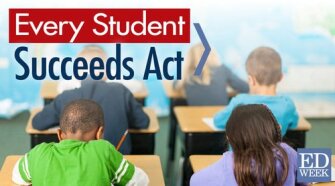
Remember the Every Student Succeeds Act’s brand new program aimed at helping states try out new forms of testing?
If not, you’re in good company. We hardly hear anything about ESSA’s “innovative assessment pilot” anymore, including from the U.S. Department of Education. That could change, however. The agency is considering next steps to open the pilot in the 2018-19 school year, a spokesman said.
When ESSA passed back in December 2015, the pilot—which would initially allow up to seven states to try out new forms of testing in a handful of districts for federal accountability purposes—was one of the most eye-catching pieces of the new law. State officials crammed conference rooms and jumped on webinars to figure out how to apply. Two big states, New York and California, expressed at least some interest. And Colorado even passed a law requiring the state education agency to seek the flexibility.
But by last summer, some of that energy had dissipated, as states realized just how difficult it would be to comply with some of the “guardrails” around the pilot, including a requirement to make sure the results of any new assessments are “comparable” to the state test. States were also looking to see if other testing flexibility in the law, including the chance to offer several “interim” assessments instead of one big, overall summative test, might meet their needs better than the pilot.
U.S. Secretary of Education Betsy DeVos has yet to say anything about the testing leeway. A department spokesman noted that regulations for the pilot written by the Obama administration were published in January. And he noted the agency is considering what it will need to do to open the pilot in the 2018-19 school year.
If that happens, there are likely to be takers. New Hampshire would like to continue with the flexibility it first gained under a waiver from No Child Left Behind. And Hawaii and New York have also expressed formal interest in their draft ESSA plans.
“It’s not that states aren’t jumping at the opportunity. It’s just that there hasn’t been an opportunity presented,” said Lillian Pace, the senior director of national policy at KnowledgeWorks, which supports state and federal policymakers around personalized-learning systems. That’s partly, she said, because of the political reality of a new administration that is also dealing with approval of ESSA plans, and has been slow to staff up. And states themselves are busy working on their ESSA plans.
“There’s been no national leadership to get this conversation started,” she said. “This has to be a federal state partnership. States are very much looking at the U.S. Department of Education now for signals on whether the [agency] is going to be a good partner in this work.”
The administration isn’t compelled to go forward with the pilot—it’s totally voluntary on the department’s part. That means DeVos and company could opt not to offer the flexibility, or wait a year or more into its term to kick-off the process. And if the Trump administration decides not to implement the pilot at all, another president, and secretary, could choose to open it down the line.
Meanwhile, though, the mere prospect of the pilot has “served as a catalyst” and spurred states to rethink their testing systems, Pace said. And that could put them in an even better position to take advantage of the testing flexibility, if and when the pilot is opened up. For example, Delaware wants to try a more performance-based approach to science testing. And Virginia is exploring performance-based tests.
“States are beginning to build these more personalized systems,” Pace said. “I think we’re seeing pretty good momentum in this area.”
